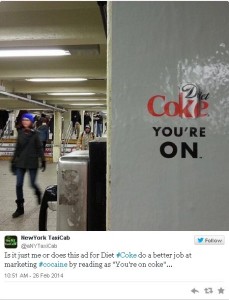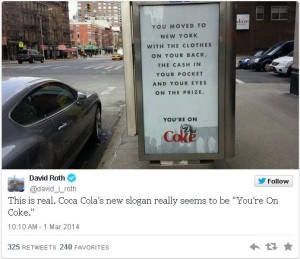Coca-Cola’s latest campaign has created stir in the Big Apple and San Francisco. The simple white posters with black lettering have been displayed at local bus stops and subways and have gained notoriety, curiosity, and controversy from onlookers. The writing depicts a scenario of a person moving to the Big Apple or San Francisco with the clothing on their back, cash in their pocket or portfolio in hand, the eye on the prize, and a concluding “You’re on Diet Coke” phrase (Mancuso & Montgomery, 2014). The campaign was created by well known Manhattan-based advertising agency, Droga5 whose clients include Unilever, Kraft Foods, and American Express (Droga5, 2014).
Some are presuming the “You’re on Coke” message is referring to the narcotic drug cocaine but Coke is denying the claims stating this statement is for the young achievers who experience “You’re On” moments that may include a first date, job interview, or speaking in front of a large audience (Wasserman, n/d). The commercial that features Taylor Swift supports the G-rated version Coke refers to but the photos taken of the simple white posters with black writing, which are displayed through the cities and exploited on Twitter, show a hidden PG-13 rating.
In 1886, a pharmacist named John Pemberton created Coca-Cola, referring to it as a “brain tonic” (May, 1988). The original recipe used coca with cocaine but company spokesmen stated the narcotic aspect was removed. Fast forward to 1988, an article in the New York Times, revealed the importer and exporter of the cocoa used in Coke but claims there are strict regulations on how the product is used and the removal drug process is overseen by authorities (May, 1988). A beverage industry analyst, Emanuel Goldman commented in this article by C. May (1988): “This is an old hat to people in the industry, when you have a good product you change it as little as possible.” (May, 1988). In defense, cocaine was a legal drug up till the 1914s and it was suggested that the drug wasn’t completely removed until the 1929s (Palermo, 2013). No one can confirm this claim for sure because the Coca-Cola recipe is a secret and is privately held by the Coca-Cola Corporation (Palermo, 2013). So the debate continues, does the message from Coke refer to a secret additive or was it a simple punctuation placement, or lack of, that threw the campaign off? You decide.
Reference
Droga5. (2014). About. Retrieved from: http://droga5.com/about/
Mancuso, V. & Montgomery, M. (2014). Badvertising: Doctors horrified by Coca-Cola’s new ads mocking cocaine addiction. Retrieved from: http://observer.com/2014/03/badvertising-doctors-horrified-by-coca-colas-new-ads-mocking-cocaine-addiction/
May, C. (1988). How Coca-Cola obtains its coca. New York Time. Retrieved from: http://www.nytimes.com/1988/07/01/business/how-coca-cola-obtains-its-coca.html
Palermo, E. (2013). Does Coca-Cola contain cocaine? Live Science. Retrieved from: http://www.livescience.com/41975-does-coca-cola-contain-cocaine.html
Wasserman, T. (n/d). Diet Coke: No, our ads aren’t drug references. Mashable. Retrieved from: http://mashable.com/2014/03/04/diet-coke-ad-drugs/



6 Responses to You’re on Coke